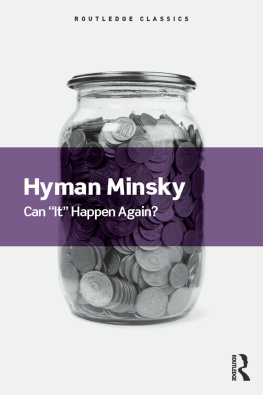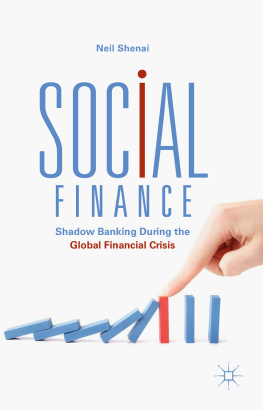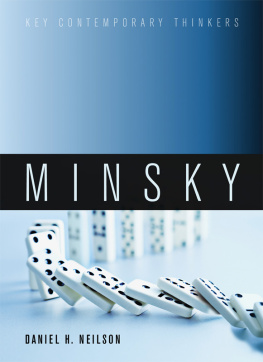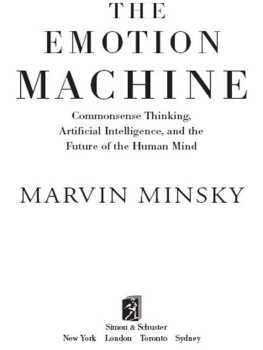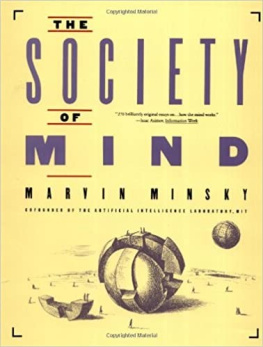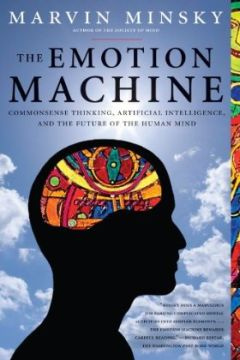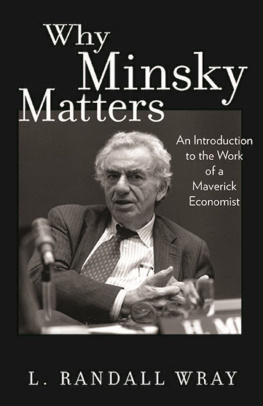Hyman Minsky - Can It Happen Again?: Essays on Instability and Finance
Here you can read online Hyman Minsky - Can It Happen Again?: Essays on Instability and Finance full text of the book (entire story) in english for free. Download pdf and epub, get meaning, cover and reviews about this ebook. year: 0, publisher: Routledge, genre: Science. Description of the work, (preface) as well as reviews are available. Best literature library LitArk.com created for fans of good reading and offers a wide selection of genres:
Romance novel
Science fiction
Adventure
Detective
Science
History
Home and family
Prose
Art
Politics
Computer
Non-fiction
Religion
Business
Children
Humor
Choose a favorite category and find really read worthwhile books. Enjoy immersion in the world of imagination, feel the emotions of the characters or learn something new for yourself, make an fascinating discovery.
- Book:Can It Happen Again?: Essays on Instability and Finance
- Author:
- Publisher:Routledge
- Genre:
- Year:0
- Rating:3 / 5
- Favourites:Add to favourites
- Your mark:
- 60
- 1
- 2
- 3
- 4
- 5
Can It Happen Again?: Essays on Instability and Finance: summary, description and annotation
We offer to read an annotation, description, summary or preface (depends on what the author of the book "Can It Happen Again?: Essays on Instability and Finance" wrote himself). If you haven't found the necessary information about the book — write in the comments, we will try to find it.
Hyman Minsky: author's other books
Who wrote Can It Happen Again?: Essays on Instability and Finance? Find out the surname, the name of the author of the book and a list of all author's works by series.
Can It Happen Again?: Essays on Instability and Finance — read online for free the complete book (whole text) full work
Below is the text of the book, divided by pages. System saving the place of the last page read, allows you to conveniently read the book "Can It Happen Again?: Essays on Instability and Finance" online for free, without having to search again every time where you left off. Put a bookmark, and you can go to the page where you finished reading at any time.
Font size:
Interval:
Bookmark:

Can It Happen Again?
Today, his views are reverberating from New York to Hong Kong as economists and traders try to understand whats happening in the markets Indeed, the Minsky moment has become a fashionable catch phrase on Wall Street.
Wall Street Journal
In the winter of 1933, the American financial and economic system collapsed. Since then economists, policy makers and financial analysts throughout the world have been haunted by the question of whether It can happen again. In 2008 It very nearly happened again as banks and mortgage lenders in the USA and beyond collapsed. The disaster sent economists, bankers and policy makers back to the ideas of Hyman Minsky whose celebrated Financial Instability Hypothesis is widely regarded as predicting the crash of 2008 and led Wall Street and beyond to dub it as the Minsky Moment.
In this book Minsky presents some of his most important economic theories. He defines It, determines whether or not It can happen again, and attempts to understand why, at the time of writing in the early 1980s, It had not happened again. He deals with microeconomic theory, the evolution of monetary institutions, and Federal Reserve policy. Minsky argues that any economic theory which separates what economists call the real economy from the financial system is bound to fail. Whilst the processes that cause financial instability are an inescapable part of the capitalist economy, Minsky also argues that financial instability need not lead to a great depression.
With a new foreword by Jan Toporowski.
Hyman P. Minsky (19191996) was Professor of Economics at Washington University St Louis and a distinguished scholar at the Levy Economics Institute of Bard College, USA. His research attempted to provide an understanding and explanation of the characteristics of financial crises, which he attributed to swings in a potentially fragile financial system. Minsky taught at Brown University, the University of California, Berkeley and in 1965 he became Professor of Economics of Washington University in St Louis and retired from there in 1990.

Routledge Classics contains the very best of Routledge publishing over the past century or so, books that have, by popular consent, become established as classics in their field. Drawing on a fantastic heritage of innovative writing published by Routledge and its associated imprints, this series makes available in attractive, affordable form some of the most important works of modern times.
For a complete list of titles visit
www.routledge.com/classics
Hyman
Minsky
Can It Happen Again?
Essays on Instability and Finance
With a new foreword by Jan Toporowski

First published in Routledge Classics 2016
by Routledge
2 Park Square, Milton Park, Abingdon, Oxon OX14 4RN
and by Routledge
711 Third Avenue, New York, NY 10017
Routledge is an imprint of the Taylor & Francis Group, an informa business
Hyman P. Minsky 1982, 2016
Foreword 2016 Jan Toporowski
All rights reserved. No part of this book may be reprinted or reproduced or utilised in any form or by any electronic, mechanical, or other means, now known or hereafter invented, including photocopying and recording, or in any information storage or retrieval system, without permission in writing from the publishers.
Trademark notice: Product or corporate names may be trademarks or registered trademarks, and are used only for identification and explanation without intent to infringe.
First published by M.E. Sharpe 1982
British Library Cataloguing in Publication Data
A catalogue record for this book is available from the British Library
Library of Congress Cataloging in Publication Data
A catalog record for this book has been requested.
ISBN: 978-1-138-64195-2 (pbk)
ISBN: 978-1-315-62560-7 (ebk)
Typeset in Joanna MT by RefineCatch Limited, Bungay, Suffolk
To Esther
CONTENTS
This volume of essays represents the early thinking of Hyman P. Minsky, one of the most original economists to have come out of the United States in the twentieth century. The essays reveal the themes that emerged from his graduate studies at Harvard University and, as the title of the volume indicates, his abiding preoccupation with the financial crisis that gripped the United States at the start of the 1930s. Nearly a century later we commonly think of that crisis as being the 1929 Crash. However, as Minskys title essay indicates, the crisis that was to haunt him through to his intellectual maturity and beyond was the 19323 financial crisis, rather than the crash in the stock market that preceded it by more than three years. The difference is important: in 1929, the stock market crashed; in 19323, in response to Herbert Hoovers attempts to balance the United States Federal budget, the stock market and the banking system started to fail, to be rescued only by Franklin Roosevelts extended bank holiday, new financial regulations, including the GlassSteagall Act and the extension of deposit insurance, and the New Deal. As these essays make clear, for Minsky avoiding It was not just a matter of supporting the stock market and refinancing banks. It had to involve fiscal stimulus to prevent a fall in aggregate demand, but also to provide the financial system with government securities whose value was stable.
At the time of the crisis Minsky was entering his teenage years. He had been born in 1919 to parents who were Menshevik refugees from Russia. They engaged with socialist politics and the trade union movement in
After graduating from Harvard, Minsky taught at Brown University, and then the University of California in Berkeley, before being appointed in 1965 to a professorship at Washington University in St. Louis. After his retirement in 1990, he was appointed a Senior Scholar at the Levy Economics Institute of Bard College, where he worked until he died in 1996.
The essays in this volume include his first published works (Central Banking and Money Market Changes and Monetary Systems and Accelerator Models) which clearly came out of his doctoral researches. By the 1960s, reinforced by his work as a consultant to the Commission on Money and Credit, Minsky was concerned with showing how an accommodating policy of the Federal Reserve and countercyclical fiscal policy were essential to avoid financial instability. This appears in his title essay Can It Happen Again? A credit squeeze in 1966, headed off by the provision of liquidity by the Federal Reserve, confirmed for Minsky that the dangers of financial instability remained ever imminent. But the lessons were not learnt, and subsequent credit crunches became full-scale recessions of increasing magnitude, culminating in the 1979 Reagan recession (Finance and Profits: The Changing Nature of American Business Cycles).
After Henry Simons, the Chicago critic of liberal banking policies, Minsky was perhaps most influenced in his financial theories by Irving Fishers views on debt deflation. His earliest attempts to analyze financial crisis take the form of examining responses to what would nowadays be called shocks, affecting expectations of profit from investment. Such shocks would then induce increases, or decreases, in investment and the financing required for such undertakings. Changes in investment were almost universally regarded as the active expenditure variable in the business cycle. Credit conditions were the crucial circumstances that determined the financing of investment and often investment itself.
Next pageFont size:
Interval:
Bookmark:
Similar books «Can It Happen Again?: Essays on Instability and Finance»
Look at similar books to Can It Happen Again?: Essays on Instability and Finance. We have selected literature similar in name and meaning in the hope of providing readers with more options to find new, interesting, not yet read works.
Discussion, reviews of the book Can It Happen Again?: Essays on Instability and Finance and just readers' own opinions. Leave your comments, write what you think about the work, its meaning or the main characters. Specify what exactly you liked and what you didn't like, and why you think so.

